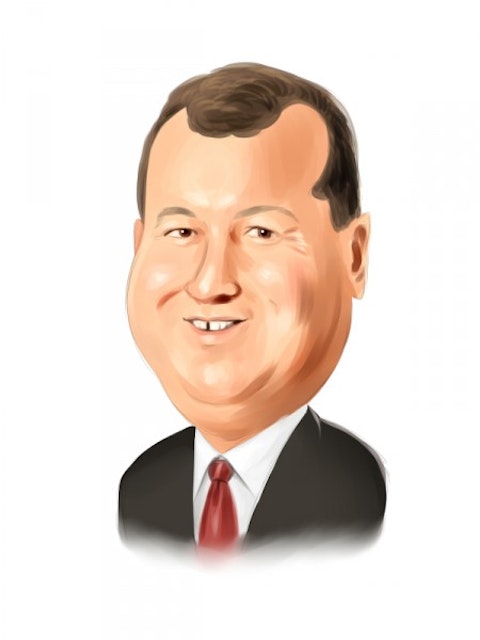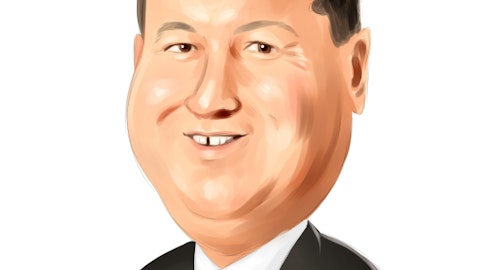Tom Gayner’s Markel Gayner Asset Management, the investment division of financial holding company Markel Corporation (NYSE:MKL), has filed its latest 13F with the Securities and Exchange Commission for the reporting period of March 31. We previously covered the firm’s top picks for the second quarter, as well as the cheapest energy stocks it’s invested in. Now we’ll move on to the healthcare sector, targeting the cheapest healthcare stocks picked by Markel Gayner, one of the best performing investment managers in the world over the past five years, returning over 20% on average during that time.

Hedge funds and other big money managers like Gayner tend to have the largest amounts of their capital invested in large and mega-cap stocks because these companies allow for much greater capital allocation. That’s why if we take a look at the most popular stocks among funds, we won’t find any mid- or small-cap stocks there. However, our backtests of hedge funds’ equity portfolios between 1999 and 2012 revealed that the 50 most popular stocks among hedge funds under-performed the market by seven basis points per month. On the other hand, their top small-cap picks performed considerably better, outperforming the market by 95 basis points per month. This was confirmed through backtesting and in forward tests of our small-cap strategy since 2012. The strategy, which involves imitating the 15 most popular small-cap picks among hedge funds has provided gains of more than 137%, beating the broader market by over 82 percentage points through the end of March (see the details).
We begin with UnitedHealth Group Inc. (NYSE:UNH), which was added to Markel Gayner’s portfolio during the first quarter of 2013. As of the latest reporting period, the position was made up of 663,000 shares with a market value of $78.43 million. UnitedHealth Group Inc. (NYSE:UNH) paid almost immediate dividends to Gayner, gaining over 10% within the first two weeks of the second quarter of 2013 and has been on a steady rise throughout the past two-plus years, with shares nearly doubling in value. That strong run has continued right into 2015, as UnitedHealth Group has gained over 14% year-to-date. The largest healthcare company in the world, UnitedHealth Group Inc. (NYSE:UNH) operates primarily in the insurance field and has benefited greatly from the implementation of Medicare, ballooning its U.S membership to over 25 million. First quarter profits for the company stood at $1.41 billion or $1.46 per share, a 28.6% gain year-over-year. Shares currently trade at a reasonable P/E of 19.30 and a forward P/E of 16.36. John Shapiro’s Chieftain Capital was one of the most bullish investors of UnitedHealth Group, with equity portfolio exposure of over 9% to the stock through a position of 1.66 million shares. That holding helped Shapiro achieve strong first quarter returns of 10%.
Novo Nordisk A/S (ADR) (NYSE:NVO) is the next healthcare stock in Gayner’s portfolio, with the position of 1.08 million shares having a value of $57.39 million.Novo Nordisk A/S (ADR) (NYSE:NVO) trades at a higher P/E of 32.57 and forward P/E of 30.01, though it operates in the biotech sector, whose stocks tend to be more aggressively priced based on their future potential. Some of that potential is becoming realized with Novo Nordisk, with the Danish company’s latest earnings showing a profit of $1.48 billion, a 50% gain year-over-year. Gross margins also improved to nearly 85% as it benefited from the rising U.S dollar in relation to the Danish Kroner. Among the company’s best performing drugs were its diabetes drugs Levemir and Victoza, which generated $1.2 billion in sales. Novo Nordisk was one of the stocks hedge funds made a bundle on in the first quarter, as it returned 28.3%. Among the funds who scored big on the stock was Jim Simons’ quant fund Renaissance Technologies, which had the stock in second position in its massive portfolio heading into 2015.
Next we come to Johnson & Johnson (NYSE:JNJ), a dow stock that hedge funds are crazy about. The $278.30 billion market cap manufacturer of a wide range of pharmaceutical treatments, health products, and medical devices also ranks as a dividend aristocrat, having not lowered its dividend payments for nearly three decades, since its first payment in 1987. Johnson & Johnson (NYSE:JNJ) currently pays a dividend of $0.75 quarterly to shareholders, with a yield of 2.98%. Markel Gayner has been one of those shareholders dating all the way back to 2000 and maintains a position of 574,200 shares worth $57.77 million as of March 31. The stock was a middling performer throughout the 2000’s, gaining just 38% in ten years. However the stock has performed much better over the last three years, rising by 56%, and appears poised for continued growth courtesy a strong drug pipeline. Shares currently trade at a P/E of 18.00 and a forward P/E of 15.69. Prominent value investors Cliff Asness and Donald Yacktman are among the top shareholders of Johnson & Johnson (NYSE:JNJ).
Disclosure: None




